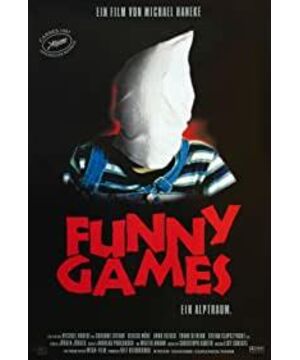Nothing can mobilize the fear of the audience more than the innocent suffering of a family of three (with pets) living a good life and good character. Haneke, it's really yours.
Cruel Killing is both a fun game for two murderers and a brutal joke for Haneke to break the fourth wall. Mental manipulation (harassment, intimidation, threats, humiliation, hiding and pursuit), physical attacks (beating, coercion, abuse), the entire film does not have a direct violent scene, but throws a cloud of fear and anxiety over all audiences. Through several direct interactions between the criminal and the audience, Haneke not only forced the audience to be more involved in the violent process, but also rudely asked the audience to enjoy the pleasure of the violence. The two strong emotions of disgust and pleasure created the anti-gazing antinomy. The crime process should be filled with a large number of scenes with drastic changes, but the strange long shot here strengthens the audience's sense of presence, and through the real passage of time, creates the audience's complicity in breaking through the screen. In the works of some directors (real-name nominee Lassi Von Trier), the audience can enjoy the pleasure brought by desperate torture, feel the blood splashing, and feel the separation of the body and the head. At this moment, the audience is the perpetrator of "prompted". "Prompted" means the presence of others and the condemnation of mainstream values. Your eccentric proclivities bring not only evil euphoria, but also an intolerable guilt.
The camera freezes on the blood-splattered TV, reflecting Haneke's mockery of the act of "watching." The mass media, that is, the low culture or gang culture that Adorno reflects on, are like two low-status perpetrators who justifiably lurk into beautiful houses and occupy territories that do not belong to them. The perpetrator continued to seduce the audience and asked directly: "Do you think enough is enough? Do you want to see the final ending of the story?" Probably the torture of cultural producers using a lot of violence and pornography to attract audiences to pay for culture as a commodity . One of the perpetrators could actually pick up the remote control and rewind the time before his companion was shot by the heroine, which completely challenged the audience's judgment on the development sequence of a linear story. It's actually illogical within the film's narrative as there is no hint that this is a "science fiction" movie (oddly, even though the characters have broken the fourth wall, I still sometimes forget this It is a crime that has been suggested to be false. Will still take the plot seriously, instead of taking a stripped point of view and dismissing the life and death of the victim. The necessity of "authenticity" and the means by which it is shaped seem to be the content of the discussion. one). In fact, today, this gameplay has been very accepted in interactive film and video games. Players can manipulate the fate of game characters at will. There are also interactive films such as "Black Mirror" that allow audiences to write their own stories. In this process, the player/audience is given the supreme right to dominate, directly creating a lot of violent/erotic stimulation, just like the two murderers of other people's life and death in the game. So I tend to think that, through the extreme violence of provocation, Haneke thinks about the medium (then mostly production-side film and television works, now more interactive games and movies) and the content (pornography, violence, privacy leaks) , falsely performed for effect, ostentatious) justice.
The cause of violence is no longer necessary to seek. As Rebel Without a Cause suggests, violence has its causes. Whether it is a physiological drive or acquired stimulation, whether it is active or passive. But if the reasons for sin are readily available, then the reasons for sin are not worth mentioning, because there are many reasons for not sinning. All in all, the film does everything it wants to be. I just got a ton of mental attacks...help??
View more about Funny Games reviews









